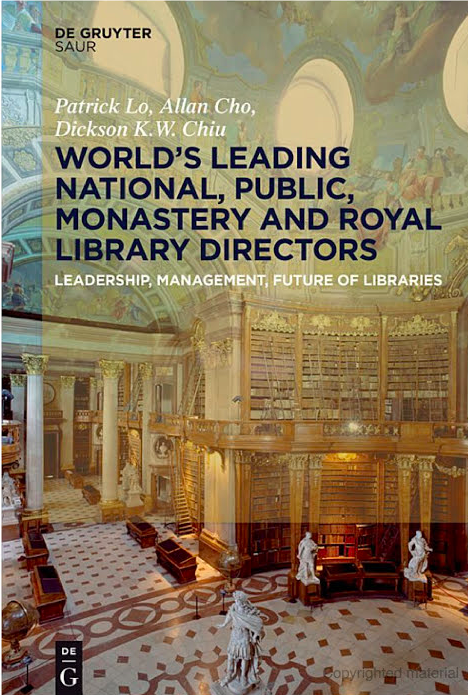This is our book on practicing library professionals, but the very first joint interview book project dedicated to documenting on a global scale, the senior leadership and managerial skills, strategic planning as well as professional developments – of the skills and aptitudes that an "effective, total leader" needs in the world of librarianship today. Each individual library director appearing in this book is highly experienced and greatly respected for their integrity, endeavors and contributions in his or her own right. Their participation in this interview book project, sharing with our readers, their valuable professional practices, unparalleled experiences and unique perspectives, creates such valuable professional learning opportunities for practicing library professionals who continue to communicate with each other on a cross-national, as well as on a cross-cultural level.
As renowned management scholar Henry Mintzberg of McGill University theorizes, “managing is about influencing action. Managing is about helping organizations and units to get things done, which means action. Sometimes, managers manage actions directly. They fight fires. They manage projects. They negotiate contracts.”
So as the individuals profiled in this book will tell us, their roles are manifold and complicated, involving a range of tasks and abilities that require experience, dedication, and creativity that not only keep the library’s operations afloat but thrive under their guidance. We are fortunate that these busy leaders of knowledge are able to generously share with us their time and knowledge in the making of this book. It was simply a pleasure to learn through their experiences and expertise by “picking” their brains about how these library managers not only shape the missions of their respective libraries, but also how they are shaped by their own experiences into become current leadership positions. The people we interview in this book include the following:
National and state libraries
1 David S. Mao, Acting Librarian, Library of Congress
2 Dr. Johanna Rachinger, Director General, Austrian National Library
3 Caroline Brazier, Chief Librarian, British Library
4 Ana Santos Aramburo, Director, National Library of Spain
5 Marie-Christine Doffey, Director, Swiss National Library
6 Andris Vilks, Director of the National Library of Latvia
7 Prof. Dr. Renaldas Gudauskas, Director General, Martynas Mažvydas National Library of Lithuania
8 Alberto Manguel, Director, National Library of Argentina
9 Jelena Djurovic, Director, National Library of Montenegro
10 Dr. Claudia Lux, Librarian, Project Director of the Qatar National Library
11 Oren Weinberg, Director, National Library of Israel
12 Dr. Ismail Serageldin, Director, The Library of Alexandria (Egypt)
Public and city libraries
13 Pam Sandlian Smith, Director, Anythink Libraries, Adams County (Colorado)
14 Christopher Platt, Chief Branch Library Officer, New York Public Library
15 John F. Szabo, City Librarian, Los Angeles Public Library
16 David Leonard, President, Boston Public Library
17 Felton Thomas, Jr., Director of Cleveland Public Library
18 Mary Anne Hodel, Director/CEO, Orange County Library System
19 Misty Jones, Director, San Diego Public Library
20 Marcellus Turner, City Librarian, The Seattle Public Library System
21 Kate P. Horan, MLS, Library Director, McAllen Public Library (Texas)
22 Dr. Hannelore Vogt, Director, Cologne Public Library
23 Christine Brunner, Director, Stuttgart City Library
24 Sandra Singh, Chief Librarian, Vancouver Public Library
25 Shih-chang Horng, Director, Taipei Public Library
26 Father Maximilian Schiefermüller O.S.B., General Director, Admont Abbey Library
27 Dr. Cornel Dora, Director, Abbey Library of Saint Gall
28 Oliver Urquhart Irvine, The Librarian & Assistant Keeper, The Queen’s Archives


